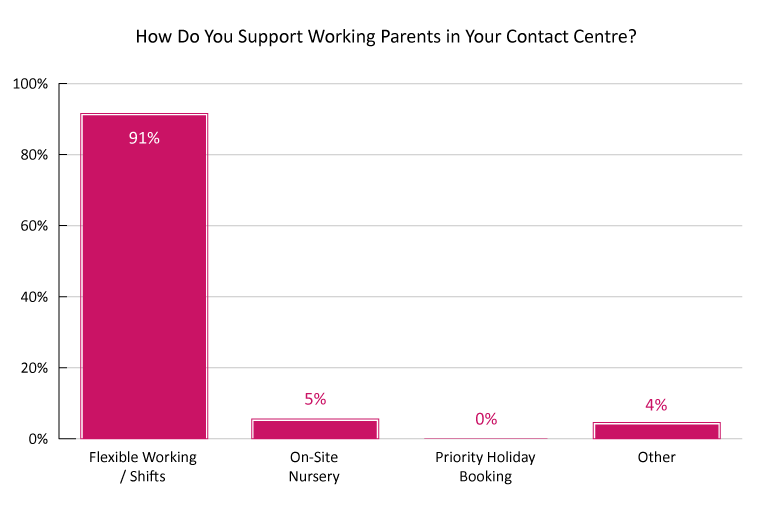22nd January 2025

It’s inevitable that some (if not, many) of your contact centre agents will be parents.
While this brings unique challenges to day-to-day contact centre life, it also creates opportunities to build a workplace that supports them through the ups and downs of parenting, and ultimately aids staff retention.
So how do you make sure you’re doing this well? Our Editor, Megan Jones, spoke to Alec Bowman-Clarke, Martin Teasdale, Sarah Thompson, and Sirisha Peters for their best ideas and inspiration.
Here are 10 ways to better support working parents in your contact centre:
A good starting point is to invest time in getting to know your team members and their families, so you have a good awareness of whether they have children (or not) and what additional support they might need. It’s about being mindful.

“If you’re directly involved in managing teams, you should know what’s going on with them and their children.
For example, how old they are, what they’re doing and any issues or underlying health problems they might have. It’s your job to know those things.
You’ve got to be curious about people and their family makeup, and how that might impact how they show up at work.” – Martin Teasdale
As part of your diversity and inclusion programme of different networks, set up a parenting network to create a safe space for parents to meet and share their experiences, as well as get advice from HR and business leaders.
This could be run virtually or through face-to-face coffee mornings. Just make sure it’s inclusive to all parents and takes surrogacy, adoption, and shared parental leave into consideration too.

“It’s nice to feel like you’re not alone in being a working parent.
We often hear about empathy when it comes to emotional intelligence, but empathy is only about perceiving how somebody feels, whilst sympathy is someone saying “oh my gosh, I remember that phase” when you say your baby has been up all night.
That’s what you get from bringing parents together for honest and open conversations.” – Sarah Thompson
Another benefit of setting up a parenting network is creating a collective voice for change, enabling ongoing progress towards being a more parent-friendly workplace.
Go one step further with a Head Office event dedicated to colleagues on Family Leave – just like we spotted on LinkedIn – where the Ocado team created an opportunity for parents and parents-to-be to connect over a cuppa, share experiences, and check out some baby products from their suppliers!
Make life easier for everyone by setting up request management rules in a mobile app, available through your workforce management provider.
“Deploy the mobile app and make the request management rules flexible enough to allow things through. It makes life easier for everyone.
It’s not about breaching the service level to meet everyone’s needs. It’s about empowering your teams and having the agent data you need to plan effectively.” – Alec Bowman-Clarke
This also comes down to having processes in place to handle last-minute time-off requests in the best possible way to reduce the impact on the wider team when chicken pox strikes (for example).
Supporting working parents goes beyond looking after the mums returning to work. It’s also about acknowledging the shared parental load on dads and grandparents too. For example, having open conversations about the impact of sleep deprivation.
“Sleep deprivation is used as a torture in some countries, and if you’re coming into work tired because the baby is waking everyone up in the house all night, it’s going to have an impact on your work.
This is where open conversations and offering up changes to shift patterns can help working parents through the newborn phase.” – Sarah Thompson

“One of the most crucial lessons I’ve learned is the importance of impartiality and consistency, approaching conflicts with an open mind and a commitment to fairness.
Navigating conflict isn’t just about playing referee; it’s about finding common ground and working towards mutually beneficial solutions.” – Sirisha Peters
Here are some strategies for maintaining impartiality and consistency when managing working parents:

Have you tried introducing annualized hours in your contact centre? This allows parents to (almost) work just term time if they wanted, as long as they complete all of their contracted hours across a 12-month period.

“Annualized hours is another thing that working parents like, which planners don’t traditionally, because it’s hard to contain, control and understand if it’s going well.
It can be seen as a bold move but can really give parents the freedom to work two days a week across the summer holidays (for example) and other similar working patterns to help them better juggle the school holidays alongside work.” – Alec Bowman-Clarke
Remember, it’s not just about new parents either! Parents of older children, teenagers, and even young adults will also be bringing their worries into work.
“I remember once one of my team members had a son in the army and he got deployed to Afghanistan, but no one knew this because our team leader at the time didn’t know her family circumstances, so everyone was left in the dark wondering “What’s up with Annie?” until we spoke to her ourselves and found out. But it shouldn’t have been that way.” – Martin Teasdale
Think about the physical spaces and facilities you have available for your working parents to use.
For example, some contact centres have a dedicated room for parents to use – whether that’s for pregnant women to have a rest or for returning mums to breastfeed. Others even have on-site nurseries to make it easier for working parents to access childcare near work.
If you’re unsure what your working parents want or need, ask them.
Don’t make assumptions about the shift working parents want and need.
You may find night shifts are more popular than you expect (for example), as some parents may appreciate the opportunity to work a shift that makes the school run easier to manage in the day.
It can also help to trial new shift patterns and see how it works in practice. Just because a working parent thinks the night shift might be best for them, doesn’t mean they should be held to it if it doesn’t fit their lifestyle in reality.
For expert advice on planning your contact centre shifts, read our article: 12 Shift-Planning Techniques
Finally, don’t underestimate the impact of putting all leaders through formal training and scheduling regular top-up learning sessions throughout the year.
When leaders are trained Mental Health First Aiders and have a baseline awareness (at the very least) of the challenges working parents face – both physically and mentally – they can be all the more considerate of their team’s unique needs and challenges. Even if they aren’t parents themselves.
There’s no magic solution when it comes to supporting working parents in the contact centre, but taking proactive steps to be more considerate, accepting and learning from mistakes, and leading with authenticity can all make a big difference to your team.
And remember, whichever way you slice and dice it, planning annual leave around school holidays will always be a logistical nightmare!
With massive thanks to the following people for sharing their experience for this article:
For more information on better supporting you contact centre teams, read these articles next:
Reviewed by: Xander Freeman